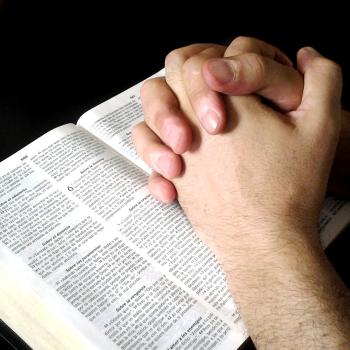Years ago I met a man who’s mother had died of cancer.
She had attended a word-faith sort of church that put a great emphasis on praying in faith and healing.
Sadly, her healing did not come and she passed away.
At the funeral, the pastor honoured the woman, but also rebuked the attendees, stating in no uncertain terms that if that people of God had more faith, this woman would still be alive today.
Her son, the man I met years later, was understandably crushed and furious about this. Was this really his fault? Had he not believed hard enough? Was his mother’s death on him and his family for not having enough faith?
He walked away from Jesus and from church for many years, and was just beginning to come back and explore when I met him. He was still badly wounded and rattled by the experience, and had lots of questions.
A key one was this:
Does a person’s lack of faith limit Jesus’ ability to work in their lives?
It is an important question indeed! If true, then if Jesus doesn’t answer prayers, one of the key reasons would have to be that we bring it upon ourselves, and that it is indeed our fault for not believing enough.
If untrue, than it is an unholy and ungodly guilt trip of a burden being laid on people, and so the answer to this is very important.
So: Does a person’s lack of faith limit Jesus’ ability to work in their lives?
The only biblical answer can be “Yes,” but we need to add a great big “but” to this.
So where does the idea even come from? Why do some believe that our lack of faith affects Jesus’ ability to answer prayers?
While there are a few places that hint at it, the key text would be this passage from Matthew:
54 Coming to his hometown, he began teaching the people in their synagogue, and they were amazed. “Where did this man get this wisdom and these miraculous powers?” they asked. 55 “Isn’t this the carpenter’s son? Isn’t his mother’s name Mary, and aren’t his brothers James, Joseph, Simon and Judas? 56 Aren’t all his sisters with us? Where then did this man get all these things?” 57 And they took offense at him.
But Jesus said to them, “A prophet is not without honor except in his own town and in his own home.”
58 And he did not do many miracles there because of their lack of faith.” (Mt 13.54-58)
So a simple reading would certainly lead us to the conclusion that our lack of faith can indeed affect Jesus’ work in our lives.
Mark’s version of the story includes the line, “He could not do any miracles there, except lay his hands on a few sick people and heal them.” (Mk 6.5)
So Jesus did not, and apparently could not, do many miracles, and the lack of faith of the people was apparently the reason.
So is it fair to say that when God doesn’t answer our prayers, our lack of faith is the reason?
It’s possible – but as with all things, context is key.
What is the “lack of faith” of the people in this story?
It’s crucial to note that these are not sincere believers, coming to God, perhaps struggling with doubt in the midst of a trial.
If our struggles with doubt eliminated us from God’s work, He would be a weak God indeed.
In this biblical story, it is not that these people struggle with faith in Jesus.
It’s that they don’t believe in Jesus at all.
It’s not a faith struggling against doubt; it’s a lack of faith entirely.
When the father of the demon-possessed man came to Jesus for help, the man acknowledged his lack of faith and struggle to believe, famously saying “I do believe; help me overcome my unbelief!” (Mk 9.24).
Isn’t that just one of the most relatable phrases ever?
“I do have faith – but Lord, help me in my doubt!”
And even though this man struggled, Jesus did not refuse his request – the man’s son was delivered and set free.
So to suggest that our struggles or moments of doubt or lack of full faith causes Jesus to turn His back on us in our need is biblically misinformed.
The people in Jesus’ hometown were rejecting Him entirely – they didn’t believe in Him at all – so of course they wouldn’t come to Him seeking miracles.
When people who struggled met Jesus, He met them with compassion.
To suggest that one’s prayers weren’t answered because they didn’t believe hard enough is dangerous.
It puts an unholy burden on people’s shoulders, and piles on the guilt and shame when things don’t go the way we prayed for.
Why do our prayers not always get answered?
There are no doubt many possible reasons, and perhaps that is a column for another time.
But let us never burden people with the unbiblical and unChristlike pressure that their ability to believe hard enough is the reason that God did or didn’t answer prayers.
It is simply not faithful to the Gospel text, nor the good God who inspired it.
********
If you’ve enjoyed what you read here, you can follow Third Way Christians on Twitter, Facebook and Instagram, or sign up here to get new columns emailed directly to you! As well, you can track along with Chris’ Sunday morning teaching at Meadow Brook Church’s YouTube page!
















